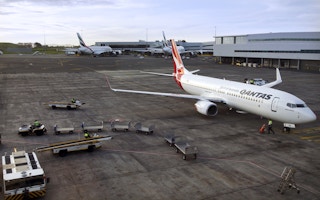Qantas has urged the Abbott government to design its direct action climate policy to encourage more efficient aircraft, better air-traffic management and less fuel usage.
Among early submissions on the details of the direct action plan - made public just before Christmas - Qantas and other companies recommended the government consider broadly what projects it might fund with its $1.55 billion emission reduction fund.
Qantas said it had identified several projects that could reduce emissions, including investing in a fleet of fuel-efficient aircraft and improving air-traffic management.
”With access to co-financing or other government support, such as funding under the Emissions Reduction Fund, this abatement and the long-term economy-wide benefits that accompany these projects could be unlocked,” it said.
Qantas recently pushed for government help - although insisted it was not looking for a bailout - after chief executive Alan Joyce hit out after rival Virgin Australia received a $35 million injection from its foreign owners. A Qantas spokeswoman said the direct action submission and the debate about the airline’s future had no connection.
A number of other submissions from big businesses and groups pressed the government to be ”flexible” with penalties and emissions baselines.
Under the direct action policy - which would replace the national carbon price if it is repealed - the Coalition had two main design elements. The first was the $1.55 billion emissions reduction fund that would fund projects that cut emissions. The second was the establishment of emissions baselines for industry and potential penalties if they were breached.
Environment Minister Greg Hunt released the green paper on direct action just before Christmas and will accept submissions until late February before finalising plans. He said he did not want the direct action policy to be punitive.
”We have no plans to use international permits,” a spokesman for Mr Hunt said, rejecting industry calls for access to cheaper carbon abatement options overseas.
In its submission, miner Rio Tinto said the government’s objective that penalties for increasing emissions would only occur in ”exceptional circumstances” must be built into its design. It said the policy should not discourage growth industries.
Industry group the Australian Petroleum Production & Exploration Association was concerned emissions baselines could impinge on expansion plans. Emissions intensity from gas fields tended to increase over time, ”outside the control of the project proponent”, the association said.
Reporting requirements should be a ”’light touch’ with no requirement for verification if a facility is not seeking funds under the ERF”, it said in its submission.
The Australian Dairy Industry Council said the likely payments on offer for emissions reductions would be outweighed by costs and, on the basis of the public details, there would ”be no opportunity for the fund to incentivise emissions reductions” in its businesses.










